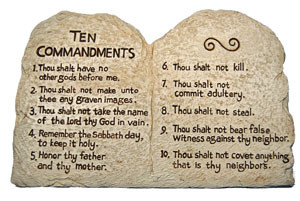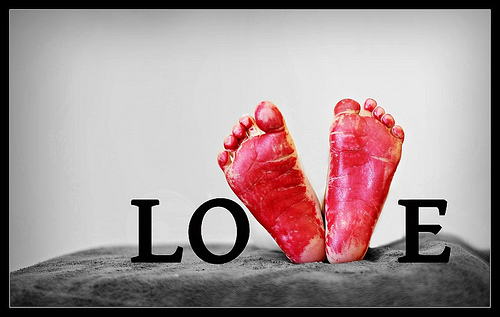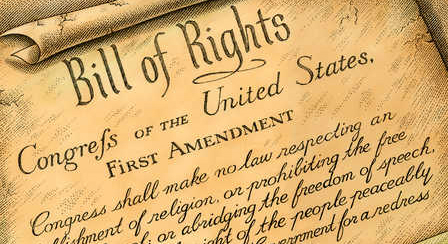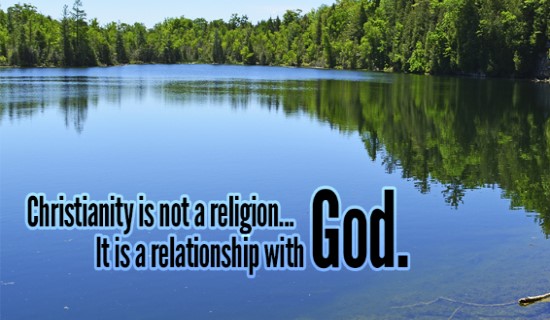 The nation of Israel came of age when Moses descended from Mt. Sinai with the law. He had just come from a terrifying meeting with God, complete with thunder, lightning and earthquakes. Rejoining the people, he presented a completely new governmental system in the form of another covenant. This covenant, called the Mosaic or the Sinaitic Covenant, became Israel’s code of governance that resonates all the way to the present day. Thus, God’s dealings with His chosen people graduated from personal interactions with select individuals into a formalized and structured relationship with a nation.
The nation of Israel came of age when Moses descended from Mt. Sinai with the law. He had just come from a terrifying meeting with God, complete with thunder, lightning and earthquakes. Rejoining the people, he presented a completely new governmental system in the form of another covenant. This covenant, called the Mosaic or the Sinaitic Covenant, became Israel’s code of governance that resonates all the way to the present day. Thus, God’s dealings with His chosen people graduated from personal interactions with select individuals into a formalized and structured relationship with a nation.
Briefly, the new government provided for a system of sacrifices to atone for sins, a priesthood to administer the atonements, and a tabernacle with furniture and utensils to house the ceremonies. In addition, God mandated the Israelites to keep the Ten Commandments, or the Decalogue, along with an entire set of laws that controlled every aspect of their lives. This code mandated the food they could and could not eat, the clothes they were to wear, how they were to treat their animals and servants, the personal behaviors that were and were not permitted, the holidays they were to observe and the doctrines of faith they were to embrace. Israel went from a loosely imposed system based on respect and loyalty to an exhaustive and exacting constitution based on the letter of the law.
The People of One God
The Mosaic covenant centered around three essential tenets of faith paramount to the Hebrew nation. First, God established absolute monotheism that was to be of profound relationship significance in the plan of God for His people. Deuteronomy 6:4, known as the “Sh’ma.” (Sh’ma Yisra’eil Adonai Eloheinu Adonai echad.) “Hear, Israel, the Lord is our God, the Lord is One.” It remains the supreme belief of the Jewish people to this day. This belief cast the Hebrew identity in stark contrast to the polytheistic cultures of the world, especially in Egypt where gods for nearly everything under the sun—including the Sun—were worshipped. The confession that there was only one God, the God of Abraham, Isaac and Jacob, speaks directly to the exclusive relationship that God desired with the Israelites. He would share His glory with no one.
God wove the ideas of love and family into this relationship construct to make His intent clear and pervasive. “And thou shalt love the LORD thy God with all thine heart, and with all thy soul, and with all thy might. And these words, which I command thee this day, shall be in thine heart: And thou shalt teach them diligently unto thy children, and shalt talk of them when thou sittest in thine house, and when thou walkest by the way, and when thou liest down, and when thou risest up. And thou shalt bind them for a sign upon thine hand, and they shall be as frontlets between thine eyes. And thou shalt write them upon the posts of thy house, and on thy gates.” Deuteronomy 6:5-9. God was to be at the very center of their lives, not just their religion, but their social, family and thought life, filling their daily routines.
God established faithfulness in the marriage relationship because it was analogous to His relationship to Israel. “Turn, O backsliding children, saith the LORD; for I am married unto you: and I will take you one of a city, and two of a family, and I will bring you to Zion.” Jeremiah 3:14. Spiritual adultery is the reason why judgment came against Israel. “Then those of you who escape will remember Me among the nations where they are carried captive, because I was crushed by their adulterous heart which has departed from Me, and by their eyes which play the harlot after their idols; they will loathe themselves for the evils which they committed in all their abominations.” Ezekiel 6:9 (NKJV).
The jealousy of God for the unadulterated love of His people carries over to the relationship He designs for the church. He refuses to be a player in the pantheon of gods. For New Testament believers, the proscription against an affair with the world derives its meaning from this relationship that God had with Israel. “Do not love the world or the things in the world. If anyone loves the world, the love of the Father is not in him. For all that is in the world—the lust of the flesh, the lust of the eyes, and the pride of life—is not of the Father but is of the world. And the world is passing away, and the lust of it; but he who does the will of God abides forever.” 1 John 2:15-17 (NKJV).
The Sin Offering
While the connotation of relationship is easily seen in the Sh’ma, the second tenet of faith, the absolution of sin, may not seem as obvious. Sin is an affront to God’s holy nature; in fact, it precludes any possible relationship with man. The offering for sin was based on the integral holiness of God which could not be compromised in any way. The sin question had to be answered before God could possibly have any dealings with his crowning creation. He designed us, He created us and He loved us, but He couldn’t accept us unless our sin was eradicated from us. When we contemplate this dissonance between God’s love and His holiness, we begin to get a feel for the awesomeness of Calvary. His holiness repelled us from Him, but His love drove Him relentlessly to us.
Yet, we must understand that sin kills the relationship a person has with God. “But your iniquities have separated you from your God; And your sins have hidden His face from you, so that He will not hear.” Isaiah 59:2 (NKJV) No more egregious teaching has contaminated the church than the idea that God pays no attention to sin, or that His grace gives license to sinful behavior. Paul addressed this issue in the book of Romans. “What then? Shall we sin because we are not under law but under grace? Certainly not! Do you not know that to whom you present yourselves slaves to obey, you are that one’s slaves whom you obey, whether of sin leading to death, or of obedience leading to righteousness?” Romans 6:15-16 (NKJV). As one preacher said, “God saves us from our sins, not in our sins!”
Moreover, our view of sin is intrinsic to our view of God. Once we start thinking that God is ambivalent toward, or even tolerant of sin, we mischaracterize the divine nature. No less than 611 times do we find the word holy in the scriptures. That frequency should be a gigantic clue as to the importance God attaches to holiness. And, the hint is not subtle. “But as he which hath called you is holy, so be ye holy in all manner of conversation; Because it is written, Be ye holy; for I am holy.” 1 Peter 1:15-16 (KJV).
God’s position against sin is moral, not just ceremonial. That means that we must be filled with His Spirit so that we may live in holiness. “This I say then, ‘Walk in the Spirit, and ye shall not fulfil the lust of the flesh.’” Galatians 5:16 (KJV) This way of life shaped the culture of the early church, and, by extension, the entire church age. This underscores the contention that the toleration of sin in a believer’s life negates the God-relationship. “Likewise reckon ye also yourselves to be dead indeed unto sin, but alive unto God through Jesus Christ our Lord. Let not sin therefore reign in your mortal body, that ye should obey it in the lusts thereof. Neither yield ye your members as instruments of unrighteousness unto sin: but yield yourselves unto God, as those that are alive from the dead, and your members as instruments of righteousness unto God. For sin shall not have dominion over you: for ye are not under the law, but under grace.” Romans 6:11-14 (KJV)
An apt illustration to clarify this tension between law and grace involves the training wheels on a toddler’s bicycle. The training wheels are the only way the child can ride the bike and stay upright. When the parent removes the training wheels, however, it doesn’t mean that it’s now okay for the child to fall over. It means that he or she can now ride upright without the training wheels! Grace supersedes the law in that it allows us to keep the morality—or the purpose—of the law without being propped up by ceremony of the law. The balance is based on an internal instead of an external condition. As our relationship with God deepens, the more conformed to His nature we become. That, in fact, accounts for our overall goal in life. “Yet indeed I also count all things loss for the excellence of the knowledge of Christ Jesus my Lord, for whom I have suffered the loss of all things, and count them as rubbish, that I may gain Christ and be found in Him, not having my own righteousness, which is from the law, but that which is through faith in Christ, the righteousness which is from God by faith; that I may know Him and the power of His resurrection, and the fellowship of His sufferings, being conformed to His death.” Philippians 3:8-10 (NKJV)
The Lifestyle
The third principle of the Mosaic covenant enacted by the law was a regimented way of life for the people. Exodus, Numbers and Leviticus contain the skeletal framework of this view, the book of Deuteronomy offers a full exposition of it. In the vein of the Federalist Papers which expounded on the U. S. Constitution, this fifth book of Moses expands on all the ramifications of the Ten Commandments. While it may sound like pure minutiae for the uninitiated, it shows the depth of God’s interest in a right relationship with Israel. The International Standard Bible Encyclopedia analyzes Deuteronomy in the following way. “The old Israel had become unique through the covenant which Yahweh made with them at Horeb, creating out of them “a kingdom of priests, and a holy nation” (Exodus 19:6). The new Israel who had been born in the desert were to inherit the blessings vouchsafed to their fathers, through the covenant just now being made in Moab. By means of it they became the heirs of all the promises given unto their fathers the patriarchs; they too became holy and peculiar, and especially beloved of Yahweh, disciplined, indeed, but for their own good, to be established as a people, as Yahweh’s peculiar lot and inheritance.” Other commentators agree that God sought to fashion Israel into a strong and healthy theocracy, capable of survival, whether against foreign enemies or internal dereliction.
While there are many sections of the book that express this principle, one of the clearest passages is found in Deuteronomy 4:3-6 (KJV) “Your eyes have seen what the LORD did because of Baalpeor: for all the men that followed Baalpeor, the LORD thy God hath destroyed them from among you. But ye that did cleave unto the LORD your God are alive every one of you this day. Behold, I have taught you statutes and judgments, even as the LORD my God commanded me, that ye should do so in the land whither ye go to possess it. Keep therefore and do them; for this is your wisdom and your understanding in the sight of the nations, which shall hear all these statutes, and say, Surely this great nation is a wise and understanding people.” As Moses explains, the secret of their success was cleaving unto Jehovah. Cleaving is a relationship word, also used to describe the marriage union. “Therefore shall a man leave his father and his mother, and shall cleave unto his wife: and they shall be one flesh.” Genesis 2:24 (KJV). God wanted them to understand that keeping the statutes and judgments was not to be merely academic or a rote exercise, but it was to grow out of a relationship with Him. Whenever the nations of the world commended Israel as a “wise and understanding people,” it was received as a form of praise for the God Israel served.
For New Testament believers, one of the most popular criticisms against living a holy life separated from the world is legalism. Any attempt to impose discipline on one’s life is labeled by some as a throwback to the legalistic practices of the Hebrews. The problem with this criticism is that it is a shallow and immature appraisal of God’s intent in giving the law. Of course, many of the regulatory details that the Israelites were to keep were significant in the context of their surroundings and the era in which they live, but have lost their meaning today. Other regulations had typology connotations and are fulfilled in Christ. But the idea of discipline holds true today and to observe these details, or standards, brings important benefits to modern Christians. For example, the use of tobacco, to imbibe alcoholic drinks or to abuse narcotics has negative and destructive effects on the body. Hence, to forbid the use of these substances is not legalism, but a deep and abiding respect for our relationship with God.
Israel’s relationship with God emerged out of these foci and provides even deeper insight into the divine nature. We need to get a feel for the context of this development to understand the significance of the new relationship. As it happens in human relationships, the circumstances in which the Israelites were held captive contributed to and shaped the outcome in the wilderness trek. The relationship that developed under the old covenant, however, was still lacking in a key aspect. God wanted more than a rigid adherence to statutes. Something better was coming.
 Wednesday, May 25, 2016 at 08:58PM
Wednesday, May 25, 2016 at 08:58PM  If we were to throw a net over the essence of Christianity, the only word that would fit would be love. Love is a relationship word; it is the tap root of relationship. An intimate relationship cannot survive or thrive if love is not the core motivator. Without love, Christianity would be reduced to nothing more than a legal action designed to force conformity and to establish another religion. With love, Christianity brings God into our lives in an intensely personal way. One does not have to look far in the Scriptures to confirm this sentiment.
If we were to throw a net over the essence of Christianity, the only word that would fit would be love. Love is a relationship word; it is the tap root of relationship. An intimate relationship cannot survive or thrive if love is not the core motivator. Without love, Christianity would be reduced to nothing more than a legal action designed to force conformity and to establish another religion. With love, Christianity brings God into our lives in an intensely personal way. One does not have to look far in the Scriptures to confirm this sentiment. 






